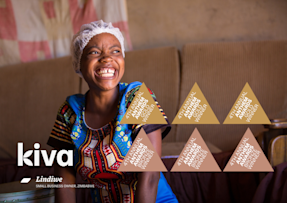If you've ever managed a large group of people, you know how hard it is to both listen to everyone's needs and understand what is best for the group as a whole. Now think about the many complex challenges faced by the poor around the world, and you can see how difficult it is for microfinance institutions (MFIs) in developing countries to move beyond a one-size-fits-all approach.
That said, Kiva makes a special effort to partner with organizations that have gone above and beyond basic credit to offer more holistic services that can help borrowers better manage their businesses and personal lives. How do MFIs do this successfully?
In a recent blog post, Lisa Kuhn Fraioli, Freedom from Hunger's vice president for Latin America, discussed the nuances involved in truly listening to clients to have a greater impact on each and every one of their lives. While visiting microfinance clients in Ecuador, she was struck by how social exclusion compounded their difficulties -- and by how targeted social services dramatically improved their ability to manage their finances.

Kiva's partnerships are ripe with examples of these types of services. To name one, our Field Partner BRAC Uganda offers an Empowerment and Livelihood for Adolescents program, providing adolescent women with a social outlet as well as life skills, financial literacy classes, and livelihood training. Participants are also eligible for microloans tailored to their age group.
I listened to a woman working in a formal association of other mothers of disabled children to do sewing of athletic clothing and uniforms for local schools and teams. Most of the children in the program are developmentally disabled but some also have other birth defects. These defects are primarily linked to the unsafe use of pesticides and other chemicals.
As she talked about the way that most of the women had been abandoned by their husbands as soon as they had an “abnormal” child, it was clear that their association was much more than just an economic activity. It was a support group as well. Some of the women’s children worked in the workshop with them. The children received therapy in the home. Since the workshop was also located in the home of one of the members, this solved one of the biggest problems facing women with disabled children — they are often tied to their homes with few opportunities to work or socialize outside the home.
Kuhn Fraioli believes that microfinance institutions -- with their deep and frequent interaction with clients and their communities -- are ideally situated to hear and understand clients' needs.
We'd love to hear your thoughts on her blog post at blog@kiva.org. Do you think microfinance organizations should be involved in delivering supportive services that respond to specific client needs? Would the costs to address them be better spent on additional loans?
We'd love to hear your thoughts on her blog post at blog@kiva.org. Do you think microfinance organizations should be involved in delivering supportive services that respond to specific client needs? Would the costs to address them be better spent on additional loans?
We value being in tune with the latest news on microfinance and poverty alleviation. Kiva Scholar is designed to share research and developments in the field and open the conversation up to you!
Photo courtesy of BRAC and World Bank
PREVIOUS ARTICLE
Passport Series: In Burkina Faso microfinance helps break down economic and social barriers →NEXT ARTICLE
Different Worlds: Two Perspectives on Borrower Privacy from Indonesia and Ukraine →















